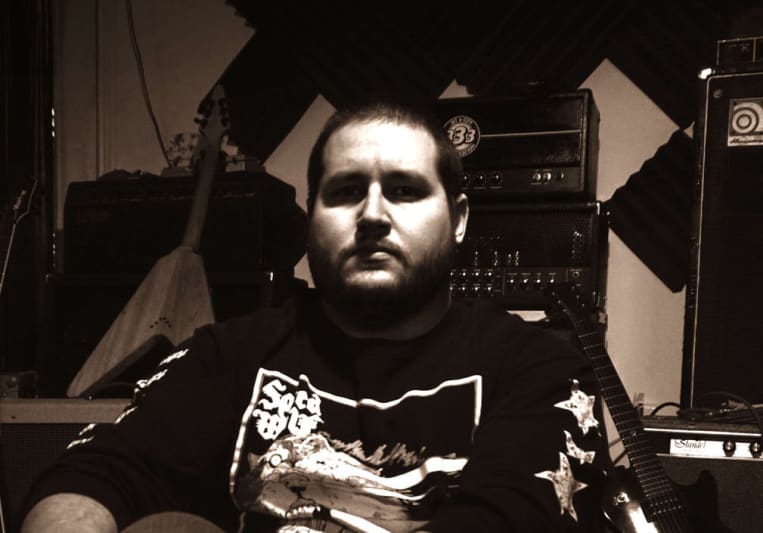
Track. Mix. Master. Destroy.
I primarily enjoy recording bands/artists, but I also do concert and corporate work.
http://www.sloanstewart.com/
Would love to hear from you. Click the contact button above to get in touch.
Interview with Sloan Stewart
Q: Tell us about a project you worked on you are especially proud of and why. What was your role?
A: I recorded and performed on an EP by horror-surf maniacs Genki Genki Panic in early 2016 that got quite a bit of praise, so that feels pretty good.
Q: What are you working on at the moment?
A: I manage production at a concert venue and I'm always looking for more artists to record or mix.
Q: Analog or digital and why?
A: I am definitely not an analog fetishist but I am definitely attracted to the idea of hardware that doesn't need to be compatible with any other software to perform it's job.
Q: What's your 'promise' to your clients?
A: I am going to bust my ass to make the best project we can make, and I expect my clients to do the same.
Q: What do you like most about your job?
A: I'm going to make music whether I get paid or not, so it's great to make a few bucks here and there. I also enjoy the illusion of choice that being a freelancer provides.
Q: What questions do customers most commonly ask you? What's your answer?
A: "What do you charge?" I reply with a few options showcasing different production styles, timelines, and prices.
Q: What's the biggest misconception about what you do?
A: That it's easy and doesn't take that much time.
Q: What questions do you ask prospective clients?
A: "What is your budget?" I also have an entire guide devoted to what clients should do before and during sessions.
Q: If you were on a desert island and could take just 5 pieces of gear, what would they be?
A: Probably just an ampeg 8x10 to use as a boat. That way I could float back home and make some more damn records.
Q: What was your career path? How long have you been doing this?
A: I started playing and recording music when I was about 15 or 16 and it just consumed my life. So about 15 years of starving and striving to make things sound better. Probably not the best path one could choose, but it's the only thing that has consistently been fulfilling in my life thus far and I can't think of anything better to do!
Q: How would you describe your style?
A: I don't really think I've defined a style per say, but I work hard to make things come together for a record.
Q: Which artist would you like to work with and why?
A: I would really like to do some kind of throwback Stax records kind of stuff, think Daptone and similar. I really the sounds and grooves there and it's rare that I have the chance to work with a soul singer.
Q: What do you bring to a song?
A: I'm always aiming to bring as much energy and killer performances to a song as possible. Long days of tracking can start to suck the life out of a performer, so I'm always working to make sure we get the best takes we can. Kind of wrangling that energy if that makes sense.
Q: What's your typical work process?
A: I don't think there is such a thing as a 'typical work process'. I enjoy trying new things when I have the time and different artists may require completely different approaches.
Q: Tell us about your studio setup.
A: Currently American Sushi Recording in Atlanta's Little Five Points is my home base. http://www.americansushirecording.com
Q: What other musicians or music production professionals inspire you?
A: Tony Visconti, Andy Sneap, Kurt Ballou, and i can't forget my Chattanooga, TN pal Charles Allison who has done some great work; look him up at Spanner Sound.
Q: What advice do you have for a customer looking to hire a provider like you?
A: There is a lot of work that goes into creating a record before even showing up to the studio. Many clients think they can show up and things just magically sound good and tight. This is not the case, you have to have your shit together or you are just wasting everyone's time and money.
Q: Can you share one music production tip?
A: It's rock n roll, not rocket science.
Q: What type of music do you usually work on?
A: I typically record rock, punk, and metal styles, but I am always into working on just about anything and definitely get a chance to do that with live sound.
Q: What's your strongest skill?
A: Patience
Q: Describe the most common type of work you do for your clients.
A: Typically full productions including tracking, editing, mixing, and mastering.
- Recording StudioAverage price - $300 per day
- Mixing EngineerAverage price - $200 per song
- EditingAverage price - $100 per track
- Live SoundAverage price - $450 per concert
Per job basis.
- I've collected a bunch of shit over the years but none of that really matters - let's make some music.



